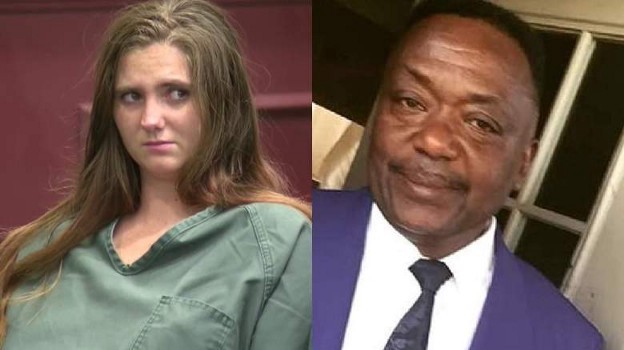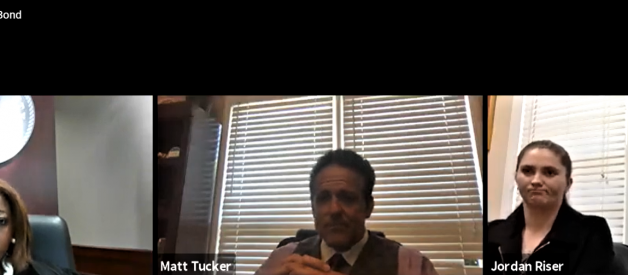Defense attorneys continue to invoke the moral virtue of the ?All American Girl,? a girl who is above murder ? even if she commits it.
Payne pursued and shot a 62-year old, Keith Herring; she claims he fled the scene of a hit-and-run with another vehicle.
 July 16, 2020. Pictured from the right: Hannah Payne (smirking), attorney Jordan Riser, attorney Matt Tucker, and Judge Shana Rooks Malone,
July 16, 2020. Pictured from the right: Hannah Payne (smirking), attorney Jordan Riser, attorney Matt Tucker, and Judge Shana Rooks Malone,
The case of Hannah Payne, a 21-year old who pursued and ultimately killed 62-year old Kenneth Herring, had been several times delayed since December of 2019 when it was originally scheduled. The case moved forward Thursday, July 16th, when a bond modification hearing was held via Zoom by the presiding judge, Shana Rooks Malone.
At the hearing, Payne once again sought to modify the conditions of her bond. Her attorney, Matthew Tucker, states that Payne is struggling to afford the cost of her ankle monitor, and is unable to work overtime, due to the curfew she is required to adhere to, as a condition her bond.
Keith Herring, a relative of the decedent was also present but did not participate in the hearing.
It is rare that an individual charged with felony murder is granted bond, yet Payne?s was granted only weeks after the incident. This was reiterated by Cobb County prosecutor Bonnie Smith. Smith reminded the Court that last year, when Payne?s lawyers initially requested a bond, that it was stated that she ?did not mind? having to wear an ankle monitor. Payne?s facial expressions shifted from pensive to annoyed as Bonnie Smith, Clayton County prosecutor.
Tucker asserted that Hannah?s life has been turned ?upside down? since she shot and killed Kenneth Herring. ?She was trying to do what she could to be a good citizen and help out law enforcement,? said Tucker.
?She?s never had so much as a speeding ticket.? Payne?s attorneys continue to paint the picture of a holier than thou defendant, one who is not a criminal, one who is somehow, above murder ? even if she commits it.
The viral, intentional murder of George Floyd, worldwide acts of civil disobedience and even corporate protest, as well as the national awakening of the significance of Black lives, have had absolutely no impact on Hannah Payne; whose motion proves she is indifferent to the cruelty that is inherent when people use fatal methods to address petty crimes.
It?s been over a year since Payne?s attorney?s initially made this play, as Tucker attempted to invoke Georgia?s citizen?s arrest statute. In a statement, Tucker described his client as an ?All-American girl? and a ?good Samaritan? who ?thought she was helping out? when she pursued Herring, even though 911 operators told her not to.
 Hannah Payne, Kenneth Herring. 2019 WSB-TV screengrab/Facebook. Payne is described by her lawyer as an ?all-American girl? and a ?good Samaritan.?
Hannah Payne, Kenneth Herring. 2019 WSB-TV screengrab/Facebook. Payne is described by her lawyer as an ?all-American girl? and a ?good Samaritan.?
The incident took place on May 7, 2019. Payne allegedly witnessed Herring leave the scene of a motor accident with another vehicle. Payne called 911, then followed Herring, despite 911 operator?s specific directions not to following Herring. It?s alleged that after some time Payne was able to cut off Herring in traffic at Riverdale Road and Forest Parkway and exited her car with her firearm.
According to witnesses, Payne demanded Herring to exit his vehicle, and shouted, ?Get out of the car, get out of the car, get out of the fucking car! I?m going to shoot you!? Shortly thereafter, she used her firearm to shoot him in the chest. She also attempted to deceive dispatch by telling them ?he shot himself with my gun? according to testimony by Police Officer Keon Hayward.
Payne?s attempt at invoking citizen?s arrest was ultimately unsuccessful because leaving the scene of an accident with no injuries is a misdemeanor, not a felony.
The willful violation of direct commands from emergency dispatch personnel is a common thread in a multitude of citizens? arrest, stand your ground, or castle doctrine defense cases. The citizen?s arrest statutes? mere existence provides justification for vigilantism, and violence in the name of ?crime-stopping,? an act so desirable to some citizens that they will attempt to execute it even in defiance of law enforcement.
The law allows citizens to arrest someone if a crime is committed in their presence or with their immediate knowledge and has been a topic of national conversation after being invoked to justify the February murder of Ahmaud Arbery.
A simple google search will produce dozens of viral videos documenting obstruction, stalking, and assaults committed by so-called good Samaritans like Payne, who insist on personally apprehending suspected criminals.
The statue?s racial overtones are all but embedded, considering the law was passed within months of the Emancipation Proclamation, they are also difficult to deny when evaluating high profile cases like the Payne or Arbery cases.
Georgia state lawmakers only recently began a formal review of the state?s citizen?s arrest law and whether it will remain on the books. Lawmakers plan to hold a series of hearings over the next month to determine what legislative reform may occur ahead of the next session in January.
Herring?s wife, Christine, described him as a grandfather of three who was a ?hardworking man, a good grandfather, a good husband, just a good person all around.? She offered to reporters outside of the Clayton County Judicial Center last March ?I?m (still) trying to figure out why she was trying to actually follow him all the way, block him in?.and kill him,? she said, ?I?m still trying to figure that out.?
Fortunately, Judge Malone ruled to deny Payne relief from her ankle monitor. Due to Georgia?s Judicial Emergency Declaration, criminal proceedings are not available for in-person viewing, however, Judge Malone has been streaming her criminal docket on Youtube since the declaration.
July 16, 2020 Bond Hearing, pictured from the top right: Hannah Payne (smirk) with attorney Jordan Riser, attorney Matt Tucker, Judge Shana Rooks Malone, prosecutor Bonnie Smith, and court reporter Kimara Jones.


